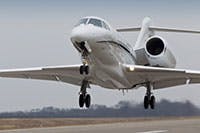APD on private jets – why the system is flawed

APD was extended to Business Aviation earlier this year and the tax came into force on 1 April 2013. This applies to business aviation flights departing from the UK, regardless of the aircraft’s country of origin.
At the time of the tax coming into effect, I was asked by several media for comment and my view was that this is primarily a political stunt.
With the onus being on the operators to register, the result will be many aircraft operators misunderstanding or ignoring the tax, especially those from overseas, who are flying in and out of the UK. Plus with private aircraft able to use over 300 airports in the UK, the task of tracking down non-payers will be almost impossible for HMRC.
See PrivateFly’s APD press release here.
In a new report published by BBGA and EBAA, we can see latest updates on how many operators are currently registering to pay APD. It’s encouraging to see that HMRC is now consulting with the industry, but from the beginning this has shown a lack of logic by applying blanket airline rules to a very different sector like business aviation.
The report acknowledges learning points and a need for further clarity. For example, of those operators that have applied, there have been incorrect declarations about whether they should be paying standard rate or reduced rate, as well as the impacts of passenger numbers on this status.
But more fundamentally, and unsurprisingly, operators are just not signing up to pay. Numbers of operators that have registered to pay APD are around 200, which is significantly below HMRC’s target of 1000. Even the target is just a third of the real number – in 2012 over 3,000 private jet companies flew into the UK, many of those with aircraft registered overseas.
The collection system is flawed and the resource needed to chase them is significant. The new report also updates on the fact that FBOs and handling agents at airports may be liable to pay if they do not enforce HMRC’s position and ensure that the operators pays their APD debts.
Let’s take London as an example of why this chasing for APD payment is ludicrous and inefficient in a fragmented industry like business aviation:
London has 14 private jet airports with 31 different FBOs and handling agents. This new liability will put pressure on small companies like FBOs with just a handful of staff.
An FBO like Northolt Jet Centre may be asked by HMRC to chase a Gulfstream G550 operator from Brazil that has used their facility, perhaps only once in the last six months. Should the FBO team at Northolt Jet Centre really be liable to try and track down this one payment, from a company that may not use them again in that same year? There would be countless similar one-offs and chasing these payments will take substantial time, effort and resource.
Apparently the objective of this is to keep pressure on operators rather than penalise the FBO, but this will stretch industry relationships, and seems a no-win situation for FBOs and handlers if they are forced to either chase, report, or be penalised themselves.
HMRC have already confirmed that APD on the business aviation industry is expected to be a ‘revenue-neutral’ exercise based on projected costs of £2 to £3 million, so they appear to be resigned to much of their potential revenue going uncollected. The simple solution is for HMRC to combine payment of private jet APD with landing fees at UK airports, and not continue with this messy and bureaucratic collection process that is simply not working.


